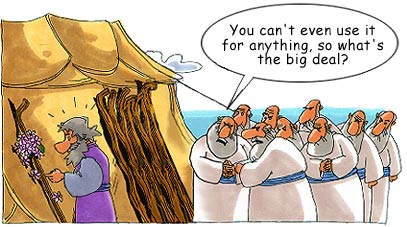|

| According
to Aristotelian philosophy, the natural order is derived from the rational
Being of God; all that contradicts nature is, by definition, contradictory
to reason. Moses Maimonides (philosopher and physician, 12th-century Spain)
adopted the Aristotelian physics and metaphysics; he concurred with Aristotle's
position that because reality derives from divine reason, not everything
imaginable is necessarily possible. While he agreed that certain acts of
nature could just not be, he differed with Aristotle on the limitation of
what exactly was possible. |
In his attempt to reconcile the concept of miracles with the Aristotelianism
that he accepted, Maimonides maintained that both the creation of the world
and miracles are voluntary acts of God; because miracles are predetermined at
the time of creation, they do not indicate a change in God's will or wisdom.
The miracle, according to Maimonides, is a unique occurrence which establishes
a reality or an order of its own. For example, the miracles of the patriarchs
and Moses established the existence of a nation with a particular role to play
in the order of the world. The revelation at Sinai established an ideal legislation
for human conduct; miracles are necessary in order to sustain the authority
of that revelation for the masses, as well as to support the biblical assumption
that God guides men by giving them the Law.[1]
|

|
| The
next day Moses entered the Tent of the Testimony, and there the staff of
Aaron of the house of Levi had sprouted; It had brought forth sprouts, produced
blossoms and borne almonds.
(Number 17:23) |
Maimonides sought to explain
biblical wonders, as far as possible, in accordance with the laws of nature.
He explained that in the miracle of the crossing of the Red Sea (Sea of Reeds),
for example, the nature of the water was not changed but was affected by another
natural force, the wind. And the revelation at Mt. Sinai, while a miracle, was
the manifestation of a particular act of creation, and may thus be considered
an addition to nature rather than an abrogation thereof. But where naturalistic
explanations seemed hopelessly irreconcilable with the biblical text, Maimonides
was prepared to invoke the supernatural power of God. Writes Allan Arkush in
his essay "Miracle": "Those who share Maimonides' belief in God's
power to contravene nature have no difficulty in accepting the possibility of
any of the miracles recorded in the Bible.[2]"
In accordance with his definition of miracles as constitutive events
of general significance, Maimonides elevated the miracles of Moses above all
others, while he interpreted allegorically many other biblical episodes which,
when understood literally, are miraculous. He claimed, for example, that when
a prophet described the ruin of a kingdom or the destruction of a great nation
in such expressions as "the stars have fallen, the heavens are overthrown,
the sun is darkened, the earth is waste and trembles," he was speaking
in metaphorical language, and these metaphors alluded to defeat.[3]
Maimonides also asserted that a miracle cannot prove what is impossible;
it is useful only to confirm what is possible.[4]
We pay no heed to one, who, by miracles and wonders, seeks to refute Moses,
whose prophecy was established not by signs but by revelation....[5]
|
[1]
Maimonides, Guide to the Perplexed (Chicago: Univesity
of Chicago Press, 1989), 2:25. (back)
[2]
Arthur A. Cohen and Paul Medes-Flohr, editors, Contemporary
Jewish Religious Thought: Original essays on critical concepts, movements,
and beliefs (New York: The Free Press, 1987), pp. 621-625. (back)
[3]
Writes Maimonides: "When great troubles befall us,
our eyes become dim and we cannot see clearly . . . whereas in a state
of gladness and comfort . . . man feels as if the light had increased.
Thus the good tidings that the people shall dwell in Zion and Jerusalem,
and shall weep no more, conclude as follows [Isaiah 30:26]: 'The light
of the moon shall glow like the light of the sun, and the sunlight shall
be sevenfold strong....'" (back)
[4]
Maimonides, Guide to the Perplexed, 3:24. (back)
[5]
Maimonides, Yad Hazakah, Yesode haTorah 8:3. (back)
|
Miracles
TABLE OF CONTENTS
|